Research: Learning during the pandemic
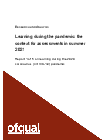
A collection of 5 reports from Ofqual studying aspects of learning during the coronavirus (COVID-19) pandemic in 2020 and 2021.
Documents
Learning during the pandemic: the context for assessments in summer 2021
Ref: Ofqual/21/6803/1PDF, 718KB, 71 pages
Learning during the pandemic: the context for assessments in summer 2021
Ref: Ofqual/21/6803/1HTML
Learning during the pandemic: quantifying lost time
Ref: Ofqual/21/6803/2PDF, 816KB, 73 pages
Learning during the pandemic: quantifying lost time
Ref: Ofqual/21/6803/2HTML
Learning during the pandemic: quantifying lost learning
Ref: Ofqual/21/6803/3PDF, 391KB, 26 pages
Learning during the pandemic: quantifying lost time
Ref: Ofqual/21/6803/3HTML
Learning during the pandemic: review of research from England
Ref: Ofqual/21/6803/4PDF, 1.13MB, 77 pages
Learning during the pandemic: review of research from England
Ref: Ofqual/21/6803/4HTML
Learning during the pandemic: review of international research
Ref: Ofqual/21/6803/5PDF, 909KB, 72 pages
Learning during the pandemic: review of international research
Ref: Ofqual/21/6803/5HTML
Details
Since schools across the nation terminated whole-class in-school tuition, back in March 2020, a body of research and analysis devoted to learning during the pandemic has emerged. To support effective policy-making in the run-up to summer 2021 (and beyond) we have closely monitored this work, to provide an evidence base for the many decisions that needed to be taken.
We have now drawn this work together as a series of literature reviews. Alongside the present report – which provides an overview of the project and its conclusions – we are publishing 4 additional reports in our ‘Learning During the Pandemic’ series:
- The context for assessments in summer 2021.
- Quantifying lost time.
- Quantifying lost learning.
- Review of research from England.
- Review of international research.
Conclusions
Our overarching objective was to understand the impact of the pandemic on levels of learning that were likely to be achieved by summer 2021, with a particular focus upon students in England from years 11 to 13. Our reports provide a context for understanding qualification results in summer 2021. In compiling these reports, we have drawn upon a wide range of research and analysis. This includes evidence from England, and from overseas, spanning both primary and secondary schooling.
On the basis of the research and analysis that we reviewed, it seems safe to conclude that:
- during each of the phases of the pandemic, students in England have had to study under abnormal circumstances, typically less than ideal circumstances, and sometimes very unfavourable ones
- by summer 2021, the most widespread concern will have been less effective learning during periods that students were studying, rather than less time spent studying, because most students will have been studying for much of the time that was available to them, albeit under abnormal circumstances – this questions the relevance of the ‘summer holiday learning loss’ phenomenon to understanding learning during the pandemic
- as the pandemic progressed through a number of quite distinct phases, learners seem likely to have lost relatively less learning, as teachers, students, and parent or carers became more adept at managing circumstances
- by summer 2021, most students are likely to have experienced a net learning loss as a result of the pandemic
- the amount of learning loss that students will typically have experienced is hard to gauge, although it may not be as extreme as some of the earliest projections
- by summer 2021, a minority of students may have achieved a certain amount of learning gain, although how large a group this might be is unclear
- socioeconomically disadvantaged students are likely, on average, to have lost relatively more learning than their more advantaged peers – however, there will be many exceptions to this general conclusion, as many advantaged students will also have been extremely seriously affected, and many disadvantaged students will not have been
- students from certain areas are likely, on average, to have lost relatively more learning than students from other areas, although this is best understood locally rather than regionally, and not all students from even the worst affected areas will have been disproportionately affected
- learning loss is a phenomenon that needs to be understood from the perspective of each and every student, individually – impacts from the pandemic are too complex and nuanced to be described simply (or even primarily) in terms of group effects
- even students from very similar backgrounds, registered in the same class at the same school, might have experienced quite different levels of learning loss, depending on the particular circumstances of their learning during the pandemic
Beyond these general conclusions, little can be said with confidence, especially concerning the details of how students in particular circumstances might have been affected.
Published 12 July 2021


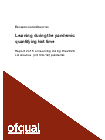
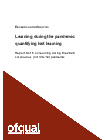
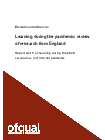
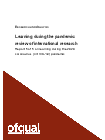










Responses